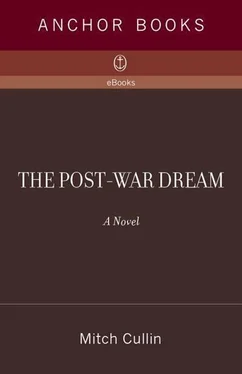Last week, while sitting at the kitchen table, Debra had said to Hollis, “Will you, please, tell me about us.” She had, under completely different circumstances, said something similar many months before as they strolled around the block one evening after dinner. By then he had stopped writing every night, had been unwilling to face those earlier years, specifically those few weeks he had spent fighting in Korea. There was a lot he just wasn't comfortable recalling, he had told her, and although he was doing his best to do so, it would probably take some time.
“Then skip the war for now,” she had suggested. “Why don't you write about us instead?”
“What do you mean?”
“Well, everyone likes a love story, right?”
“I guess.”
“So write a love story, how we met and fell for each other, all that stuff.”
“Who'd want to read that?”
“Christ, Hollis, I would.”
“I don't know, Deb. You know, I'm sure I could write a little bit about my time in Japan.”
“Okay, do that — and then you should write a Hollis and Debra epic. Tell me some things I might not know about us, and you, and how you view our life — because I'd really like to hear your take on our story. It'd likely do us some good, anyway.”
“Maybe, we'll see.”
But, to date, the book project had ground to a halt. With just over six pages completed, none of the self-assessment or introspection Debra had wanted was offered; nor was there an inkling of a wartime saga or a love story in progress — nothing at all which came remotely close to shedding any new light on their relationship, or his military service. He had, at least, begun an opening chapter for his autobiography — a chapter entitled “Where I Went amp; How I Got There” — in which he managed to write the following: Japan.You probably will figure out I'm writing all of this as things come to me and because sometimes I think of certain memories when I am in the middle of writing on something else. It has been three weeks since I wrote anything here, but today Japan popped into my head and what I mean by “Japan” is not the Japan of now. I don't know too much about what the country is like these days. No, it is the Japan of nearly fifty years ago, the Japan I knew for a small time as a soldier before getting myself shipped over to Korea. It was the U.S.-occupied Japan I experienced. Anyway, I can tell you I never intended to write a word on my military service, because it was a whole other life for me and doesn't seem worth the trouble of dwelling on. But a while back my wife said I had traveled from Tokyo to Tucson, and she said I was fortunate to have seen quite a few other places in between those two T's. Her saying that got me thinking of Japan again and I had the urge to set my thoughts down for her to read someday and so I will try to remember my days in Tokyo, 1950. Funny, it sure doesn't feel like I was ever really there, but I really was. At the time I was a kid of twenty, and in a flash I had gone from a hick American town to the streets of the largest city in Asia if not the world. I can't say there is a bunch to tell about the place. It's not like anything extraordinary happened while I was there on account of us not being at war yet. But I will write down what I can remember because it involved my early life and my wife wants to know.
While Hollis went on to describe post-war Tokyo in some basic detail — the poverty of a defeated and compliant people, a city in the bustling throes of reconstruction, the pleasure districts frequented by American troops at night, the little walkways lined by the large glowing red lanterns and the cloth banners of bars and eating houses — it wasn't the busy streets of Japan his memory readily gravitated toward. Instead, his thoughts always jumped ahead to places and people he couldn't yet invoke with written words; and when he found himself reliving that part of his past — when he reluctantly turned his mind to that brief but jarring period of his youth — it was never the battle-scarred terrain of Korea he first envisioned. Rather, he recalled the coast of Japan's southern tip and the Osumi Strait, where a convoy of four transport ships pitched upon breaking waves, forging through heavy gray sheets of rain and white, frothy spray (the iron hulls rocking, the bows crashing into the ocean before rising upward once more as navy flags continued slapping against the wind). Somewhere ahead loomed the lighthouse on Cape Sata, and beyond that — dotted here and there with tiny islands, the choppy waters swelling even higher — was the East China Sea.
Then it was the stench of vomit Hollis remembered, a disgorging fume hanging below deck, mingling with the body odors and cigarette smoke of the troops; the fresh-faced men were all crammed together within the dank, submerged quarters — breathing the stagnant air, uniforms wrinkled and stained by sweat — everyone swaying to the gyrations of the ship, some resting on cots, many sitting against partitions, while others waited in line for the head so they could retch out whatever else was left inside their churning stomachs. Soon the convoy would change course, angling northward, heading for the southern coast of Korea; but until their destination was reached, the troops were kept sequestered in their turbulent limbo, passing the hours with conversation or card games, or attempting to write letters home, or reading again those letters from loved ones which had been brought on board like precious cargo.
But Hollis had no letters to safeguard, nor had he written anyone or received a single missive since leaving Critchfield. There wasn't a hand-wringing girlfriend awaiting his return, not even a childhood friend anxious for news about him. The closest person in his life at that point had been his mother, and he hadn't yet felt the desire to inform her of his enlistment (she had last seen him walking from the house on an overcast morning, holding a suitcase, telling her only that he would be in touch once he settled elsewhere and found steady employment). Although he didn't comprehend it fully, he was — as the communal rabble loitered nearby, few giving him much attention while he remained on his fold-down cot and apart from the casual gatherings of his fellow cavalrymen — a silent, inexpressive individual, alone on the journey and without another soul for an intimate.
To kill time, Hollis filled several pages of a small notepad, fashioning detailed drawings which summoned less confining environs. A decrepit two-story farmhouse overlooking a lush valley. Two deer pausing at the edge of a creek — a doe with its snout reaching toward the water, an alert buck with its neck and head poised upright. A bowling ball floating through the atmosphere of interstellar space, drifting between twinkling stars and the bright glow of a distant sun. Finally, he sketched himself far beyond the ship's stifling quarters, placing his uniformed likeness on the moon's imaginary surface — where his ungracefully lean, tall body, his dark stubble of a crew cut, his long, gawky face took shape among craggy lunar boulders (the wide peeking eyes, dagger-sharp antennae, and skeletal fingers of tiny alien creatures made half visible behind each large rock); he gazed nervously from the page, his M1 clutched and ready, his mouth as round as the letter O , with a caption scribbled above him which asked: how on earth did I end up here?
Yet even his drawings couldn't completely vanquish the caged-in, bustling reality of his surroundings, and periodically Hollis would set his pen and notepad aside, shutting his eyes so that sleep might guide him ashore. During those restful periods, his thoughts sometimes puzzled over the Korean peninsula, that Japanese stronghold before World War II now divided bitterly into northern and southern regions, whose separate governments were at odds with each other (Moscow having armed the north, Washington having done the same for the south): the communist North Korean army had at last pressed forward in a violent bid to unify the country; this was obviously a troubling turn of events for Douglas MacArthur's supreme commandership, causing the great general to deem the situation as being critical, an emergency which required the use of peacetime soldiers stationed in occupied Japan, as well as the need to extend all enlistment for twelve months, and, then, to herd hundreds of men aboard transports, and — with the sea lanes assaulted by thirty-foot waves, the typhoon weather nearly doubling the length of what was usually a three-day voyage — to send the troops sailing from Yokohama on a direct course toward frontline skirmishes.
Читать дальше










![Theresa Cheung - The Dream Dictionary from A to Z [Revised edition] - The Ultimate A–Z to Interpret the Secrets of Your Dreams](/books/692092/theresa-cheung-the-dream-dictionary-from-a-to-z-r-thumb.webp)

